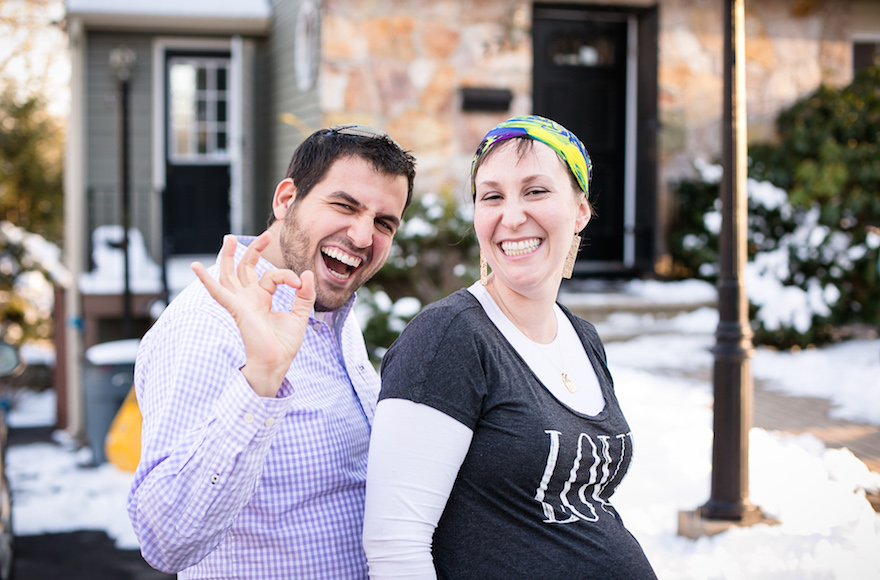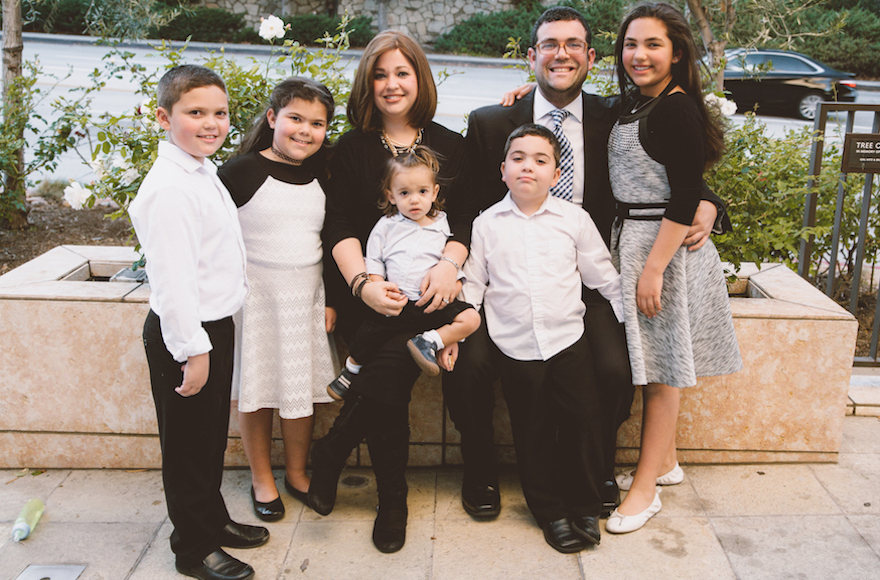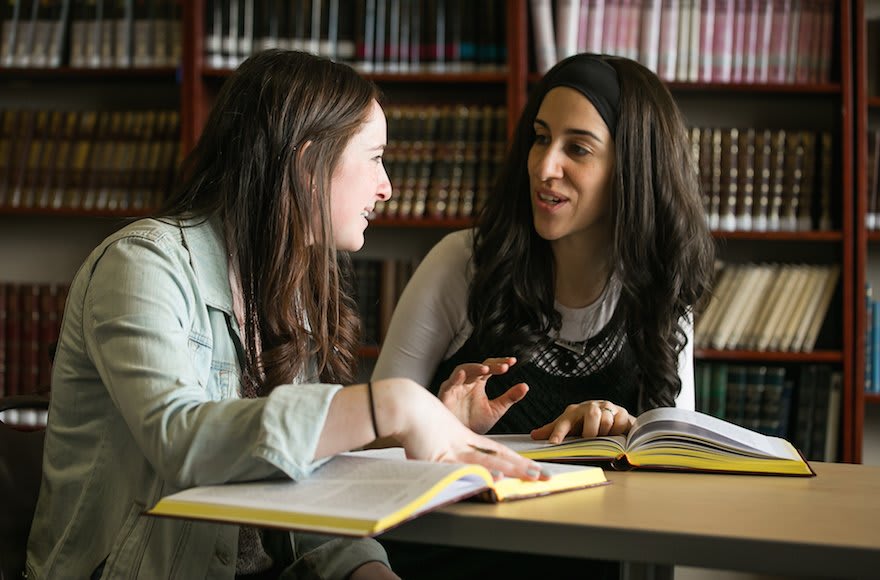
CHICAGO — Every Friday morning for a month, rebbetzin Ariel Pardo has been meeting with three female Jewish students at Brandeis University for deep conversations that wind their way from Jewish ritual to intimacy.
“Ari is always so open and she makes us feel so comfortable,” said Mollie Goldfarb, 19, a first-year student. “She gives off that warm, inviting presence everyone can be around. It’s never just her teaching us, but us learning and discussing together.”
Pardo and her husband, Rabbi David Pardo, are the Brandeis campus representatives of the Heshe and Harriet Seif Jewish Learning Initiative on Campus (JLIC), a program that places young, married Orthodox male and female educator couples on college campuses to foster and cultivate Orthodox Jewish life. The couples host everything from one-on-one learning and group classes to Shabbat and holiday meals.
A unique partnership between the Orthodox Union and the Jewish campus group Hillel, OU-JLIC currently has 60 educators on 22 campuses across North America. These modern Orthodox educators serve primarily Orthodox students, and the average educator couple serves for about four to five years.
“We’re working with a population that is very intelligent,” said Sharona Kaplan, the OU-JLIC educator at UCLA along with her husband, Rabbi Aryeh Kaplan. “Our job is to help their relationship with Judaism mature, to help them find value and relevance – and ultimately own their Judaism.”
When OU-JLIC was launched in 2000, the OU envisioned a program that included female educators as professional counterparts of their rabbi husbands – not in some secondary role.
“The OU-JLIC women educators have leadership roles equal to their husbands,” said Gideon Black, director of professional recruitment and leadership development for the program and once a OU-JLIC educator at New York University. “Many of our female OU-JLIC educators have graduate degrees in Bible or advanced Talmudic studies, and they’ve all done significant Jewish learning in Israel and the States. Our female educators are leaders on campus in a way you cannot really match in the synagogue world or within traditional Orthodoxy.”

Traditionally, rebbetzin was a title applied to any rabbi’s wife. It implied no special degree or training and delivered no monetary compensation.
Historian Shuly Rubin Schwartz, author of “The Rabbi’s Wife: The Rebbetzin in American Jewish Life,” says many rebbetzins of old, in fact, were extraordinarily well-educated and indispensable partners for their husbands. They often raised money, spearheaded charitable organizations, taught classes, hosted congregants for Shabbat and holidays, and even helped their husbands write sermons. But their stories largely have been forgotten.
“For most of history, women’s work was underappreciated, and the options for women’s work were limited, so even when women performed important work, it wasn’t acknowledged,” Schwartz said.
But in recent years, OU-JLIC female Torah educators have begun breaking that mold.
OU-JLIC female educators are expected to serve with their husbands as equal partners, and they bring to their jobs formal training and expertise. And unlike the rebbetzins of old, they are paid for their work on the same basis as the male educators.
Pardo, 30, says she didn’t grown up wanting to marry a rabbi.
“Once I started dating my husband, I realized I’d be a rebbetzin, and I became determined to redefine the role,” she said.
Today, young Orthodox women expect to be both compensated and recognized.
“We’re 21st-century women and educated professionals leading lives that are at once worldly and traditional,” said Avital Chizhik-Goldschmidt, a young rebbetzin on Manhattan’s Upper East Side who writes for Haaretz about her communal role. “We can’t be expected to throw our careers to the side for communal volunteer work, like in days of old. But for those of us who want to be seriously involved, as educators and mentors doing pastoral work alongside our husbands, there are so few professional opportunities for which we are compensated and recognized.”
She added, “Our community desperately needs religious women taking leadership roles, and if couples can do that together, as teams, I think that’s the most powerful outreach there is.”
At UCLA, the Kaplans have been the campus OU-JLIC educators for 13 years – long enough to watch former students grow up, marry, start families and even become JLIC educators themselves.
“I always wanted to work in the Jewish community, but I didn’t think I would be a campus rebbetzin,” said Sharona Kaplan, who has a bachelor’s degree from Yeshiva University’s Stern College for Women and a master’s from Yeshiva’s Wurzweiler School of Social Work. “My Jewish life was so rich and so fun and so compelling — and my husband’s was, too — that we wanted to pay it forward by trying to replicate what we were gifted through experiential Jewish living for students at UCLA.”

When they started at UCLA in 2004, they were given free reign and told to serve the community in a holistic way. They began running learning programs with students, including a jointly taught class on Jewish philosophy and law, and hosting large Shabbat meals. Thanks to Hillel, which either caters the meals or pays for them, Kaplan does not have to do much cooking.
Like all OU-JLIC educators, the Kaplans started their tenure living on campus, but after five years they outgrew their space on fraternity row and moved to a house nearby. The couple is now expecting their sixth child.
Aryeh Kaplan says he’s lucky to have Sharona working in partnership with him.
“You are not a solo practitioner, and having that person by my side also be my wife is an exceptional thing,” he said. “There is this inherent trust with each other because you work together on so many realms. Our communication, our trust, our assurance that we are there for each other is very special.”
The Kaplans also helped place three more OU-JLIC couples in Los Angeles who serve five area commuter colleges with large Jewish student populations.
The Pardos both attended UCLA and were so inspired by the Kaplans, they decided to become OU-JLIC educators, too. Being representatives of Orthodox living on the liberal campus of Brandeis comes with its challenges, Ariel Pardo says.
“My husband and I walk a very fine line,” Pardo said. “But we are really modeling a life for how to interact in a marriage and how to have a family. When you have a couple that stand for Torah and there is wrong and right, that is tremendously important.”
Black says the success of the JLIC educators has led to new leadership opportunities for Orthodox women: A growing number of Orthodox congregations are seeking to hire not just a rabbi but a rabbi along with his educator wife.
“We didn’t set out to advance the role of women’s leadership in the Orthodox community, but that’s what is happening,” said Sharona Kaplan, who is on OU-JLIC’s senior management team and one of two female educators in the six-person OU-JLIC Executive Leadership cohort. “We are thrilled with this positive development.”
The words of this author reflect his/her own opinions and do not necessarily represent the official position of the Orthodox Union.



